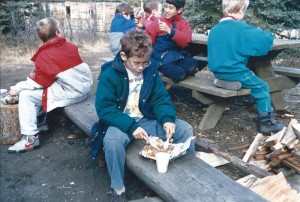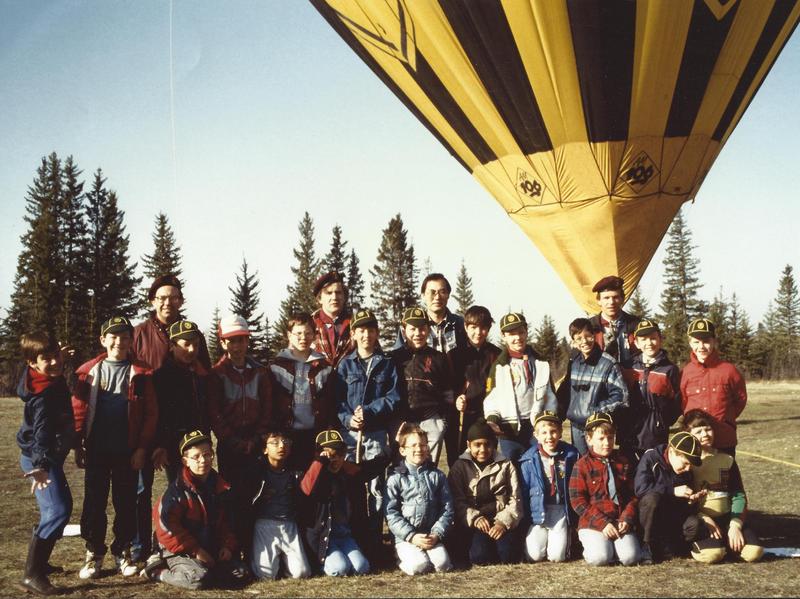The Spouse spoils me and here’s my Christmas present – a timely guest blog post from a reputable source. My parents have been staying with us for the holidays and as I type these few sentences, they are finishing the last of their packing to head home tomorrow. With that in mind, I’ll let him take over this space and I’ll take my place in front of the fire to spend some lingering time chatting face to face with my folks. Happy New Year and I’ll be writing again next week. KM
A friend used Facebook to publicise some wrestling inside his mind. He was looking into registering his son for Beavers, and although he thought his son would have fun and enjoy the companionship, he blanched at the creed which Beavers recite, which includes a declaration of belief in God. As a non-believer, he has problems sending his son somewhere where they profess such things; but as a reflexive, self-critical guy, he was also aware that a) the significance of this might well just fly over his five-year-old’s head and b) his position as the parent – there is no God – is as influential as another’s – there is a God and this is how we understand Him.
Cue existential angst.
It reminded me of an excellent passage from The Social Construction of Reality, a book by Peter Berger and Thomas Luckmann. It was written in late-1960s America, and it is definitely a product of its time, fixing on the mores and preoccupations of that period and place. Early in the section on society as subjective reality, they write this:
‘[A]lthough the child is not simply passive in the process of socialization, it is the adults who set the rules of the game. The child can play the game with enthusiasm or with sullen resistance. But, alas, there is no other game around.’
And slightly further on:
‘However much the original sense of inevitability may be weakened in subsequent disenchantments, the recollection of a never-to-be-repeated certainty – the certainty of the first dawn of reality – still adheres to the first world of childhood. Primary socialization thus accomplishes what (in hindsight, of course) may be the most important confidence trick that society plays on the individual: to make appear as necessity what is in fact a bundle of contingencies, and thus to make meaningful the accident of his birth.’
The ‘alas’ in that first passage gets at, I think, some of the turmoil my friend is feeling on this issue. We want to enable people – and I include children in that term – to make independent choices, so the residue of our influence afflicts us. I was in Beavers and Cubs, back when it was unashamedly Christian. That said, there was a Sikh kid in my group, who wore his turban as opposed to the floppy hats, and it was, in Twitter parlance, #nbd. I don’t know what discussions his parents had about the creed he spoke week on week. I was and remain a Christian, baptised Presbyterian and continuing to identify so.
My mom, if I recall the story, was raised Anglican but inclined Baptist in her teens on the east coast; my dad grew up in the Netherlands in the Calvinist, Reformed tradition. When they married, they decided to split some of that difference and find a church that worked for both of them. Their decision – not accidental but nonetheless a compromise – set the social conditions into which I was born, and those conditions have remained important to me throughout my life. But beyond that first decision of my parents, there are a multitude of unknown ‘what-ifs’ that could have altered my identification with Christianity, Protestantism, and Presbyterianism, my feelings about it, and who I am and what I believe now. We just don’t know what will take hold and what will slacken over time. And if it’s no more than a confidence trick, I remain a sucker to this minute.

The fellowship my friend wants his child to encounter in the Scouting programme, as well as maybe some groovy skills that include cooking beef, potatoes, and carrots in tin foil on a fire he helped make, is one set of experiences that will shape him. The utterance of belief in God is another, and the way the child is brought up in his home is yet another. The dream of a seamless meld here is a fantasy, because we are ourselves contradictory, before we even get to the contradictions we experience when we meet other people.
We want to be consistent – in our lives and especially with our children – and it’s legitimate for my friend to worry about awkward questions from his son. Then again, as a hot-headed teenager, he might angrily accuse his parents of hypocrisy (or of short-changing him: ‘I never got to go to Beavers because YOU thought it wasn’t good to say I believe in God! I hate you forever!’) We can’t forestall their eventual anger at us for something, and we should not be blind to the multiple contradictions we already inhabit. Better to arm our children with the example of humility and moderation, along with a concession that, as parents/adults, we don’t always make the right decisions.
Michael Munnik is a member of Knox Church, Ottawa. He writes occasionally at An Earth Without Grammar and you can find him on twitter.




